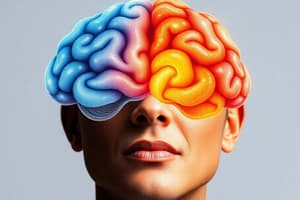Podcast
Questions and Answers
Which key feature of self-reflection involves turning one's attention inward and exploring one's thoughts?
Which key feature of self-reflection involves turning one's attention inward and exploring one's thoughts?
- Introspection (correct)
- Goal Alignment
- Feedback Integration
- Emotional Awareness
What practice can enhance self-awareness by promoting focused attention on the present moment?
What practice can enhance self-awareness by promoting focused attention on the present moment?
- Decision Evaluation
- Goal Setting
- Social Awareness
- Mindfulness (correct)
Which of the following is NOT a key aspect of self-awareness?
Which of the following is NOT a key aspect of self-awareness?
- Personal Values and Beliefs
- Reflection
- Social Awareness
- Goal Setting (correct)
What does 'SMART' stand for in the context of goal setting?
What does 'SMART' stand for in the context of goal setting?
What does self-reflection help individuals evaluate when faced with decisions?
What does self-reflection help individuals evaluate when faced with decisions?
Which aspect of self-awareness involves acknowledging strengths and weaknesses without judgment?
Which aspect of self-awareness involves acknowledging strengths and weaknesses without judgment?
Which of these is a principle of effective goal setting?
Which of these is a principle of effective goal setting?
Which practice involves purposefully examining and contemplating one's thoughts, feelings, and actions?
Which practice involves purposefully examining and contemplating one's thoughts, feelings, and actions?
How does mindfulness help in enhancing self-awareness?
How does mindfulness help in enhancing self-awareness?
Which of the following is a characteristic of self-aware individuals?
Which of the following is a characteristic of self-aware individuals?
Flashcards are hidden until you start studying
Study Notes
Self-Awareness
- Recognize and understand one's own thoughts, feelings, motivations, and actions
- Key component of emotional intelligence and personal development
- Enables navigation of social situations, management of emotions, and informed decision-making
Key Aspects of Self-Awareness
- Reflection: introspectively contemplate experiences, behaviors, and reactions
- Emotional awareness: understand one's own emotions
- Personal values and beliefs: align with one's authentic self
- Understanding motivations: insight into desires and drives
- Acceptance of strengths and weaknesses: acknowledge both without judgment
- Social awareness: understand impact on others and how others perceive them
- Continuous learning: growth mindset and willingness to learn from experiences
Mindfulness
- Enhances self-awareness through focused attention on the present moment
- Observes thoughts and emotions without immediate judgment
Self-Reflection
- Intentional practice of examining and contemplating thoughts, feelings, experiences, and actions
- Looks inward to gain deeper understanding of oneself, values, and motivations
- Allows learning from experiences, making sense of emotions, and making informed decisions
Key Features of Self-Reflection
- Introspection: turns attention inward to explore thoughts and feelings
- Analysis of experiences: examines both positive and challenging events
- Questioning and inquiry: asks oneself probing questions to explore motivations and values
- Goal alignment: reflects on whether actions align with goals, values, and aspirations
- Emotional awareness: examines emotional state, identifying and understanding emotions
- Feedback integration: considers feedback from others, aligning with self-perception
- Decision evaluation: evaluates factors influencing choices
Goal Setting
- Defines objectives and creates a roadmap for achieving them
- Provides direction, motivation, and a framework for success
Key Steps and Principles for Effective Goal Setting
- Define clear objectives: specificity, measurability, relevance
- Set SMART goals: specific, measurable, achievable, relevant, time-bound
- Break down larger goals into smaller, manageable tasks or milestones
- Prioritize goals: identify critical goals and prioritize them
- Create an action plan: outline specific actions and steps needed to achieve each goal
Studying That Suits You
Use AI to generate personalized quizzes and flashcards to suit your learning preferences.




